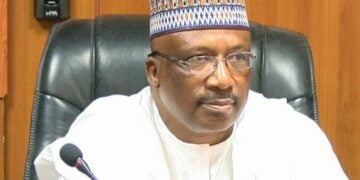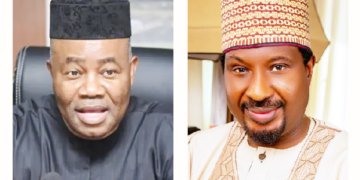The Minister of Women Affairs and Social Development, Hajia Imaan Sulaiman-Ibrahim on Wednesday disclosed that about 31 percent of Nigerian women between the ages of 15 and 49 years experienced physical violence.
This is just as the Minister also hinted that over 28 percent of women across Nigeria have suffered a case of sexual violence at least once in their lifetime.
Hajia Sulaiman-Ibrahim stated that available statistics have shown the “stark reality” of Nigeria, notwithstanding some progress recorded in the fight against Gender Based Violence (GBV).
The Minister disclosed these in Abeokuta, the Ogun State capital, while speaking at the Sexual Assault Referral Centre in the state where she had a stop-over during a working visit she made to the state capital.
Speaking further, the Minister lamented that the figure was not just an ordinary statistics, but fellow citizens who “are daughters, sisters, mothers, and neighbours,” saying “each number carries a human face and a human story.
“They remind us that gender-based violence is not a private problem but a community crisis that undermines peace, family life, and development.”
The Minister said the statistics showed that major stakeholders must act urgently, with both compassion and commitment.
She said under the Renewed Hope Agenda of President Bola Tinubu, her ministry has embedded the vision in the Social Impact Intervention Programmes designed to “restore dignity, expand opportunities, and strengthen families, ensuring that no woman, child, or vulnerable person is left behind.”
Also speaking, the Commissioner for Women Affairs and Social Development, Adijat-Adeleye explained that the Sexual Assault Referral Centre (SARC) and the Women Development Centre were established because the state government believes that “healing must go hand-in-hand with rebuilding.”
Adijat-Adeleye, a former member of the House of Assembly, said, “At the SARC, survivors come in with pain, but they do not remain defined by it. Here, wounds are treated, tears are wiped, voices are restored, and shattered lives begin the journey to wholeness again.
“But as we reflected, we asked ourselves: what happens after the tears are wiped and the scars begin to heal? Survivors need more than just recovery, they need renewal. That is why, just a few steps away, we placed the Women Development Centre,” she said.
She, however, called on the Federal Government for more funding support for intervention projects, grassroots awareness, stronger policies, and wider programmes that ensure that no survivor slips through the cracks.
“If Ogun State has lit the fire of protection and empowerment, we ask that the Federal Government to pour more oil that makes the flame impossible to quench,” Adeleye said.





